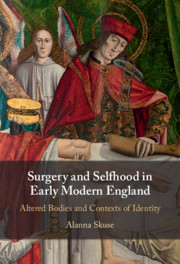
-
Select format
-
- Publisher:
- Cambridge University Press
- Publication date:
- February 2021
- February 2021
- ISBN:
- 9781108919395
- 9781108843614
- 9781108826181
- Creative Commons:
-
This content is Open Access and distributed under the terms of the Creative Commons Attribution licence CC-BY-NC 4.0.
https://creativecommons.org/creativelicenses - Dimensions:
- (229 x 152 mm)
- Weight & Pages:
- 0.43kg, 210 Pages
- Dimensions:
- (229 x 152 mm)
- Weight & Pages:
- 0.31kg, 210 Pages
Open AccessYou have access to this book
Book description
Offering an innovative perspective on early modern debates concerning embodiment, Alanna Skuse examines diverse kinds of surgical alteration, from mastectomy to castration, and amputation to facial reconstruction. Body-altering surgeries had profound socio-economic and philosophical consequences. They reached beyond the physical self, and prompted early modern authors to develop searching questions about the nature of body integrity and its relationship to the soul: was the body a part of one's identity, or a mere 'prison' for the mind? How was the body connected to personal morality? What happened to the altered body after death? Drawing on a wide variety of texts including medical treatises, plays, poems, newspaper reports and travel writings, this volume will argue the answers to these questions were flexible, divergent and often surprising, and helped to shape early modern thoughts on philosophy, literature, and the natural sciences. This title is also available as Open Access on Cambridge Core.
Reviews
‘This is a valuable, well-researched examination of how altered bodies disrupted ideas about the self within an early modern Christian context. Recommended. Graduate students and faculty’.
B. Lowe Source: Choice
Contents
Full book PDF-
Surgery and Selfhood in Early Modern England
pp i-ii -
-
- You have access
- Open access
- HTML
- Export citation
-
-
Copyright page
pp iv-iv -
-
- You have access
- Open access
- HTML
- Export citation
-
-
Contents
pp v-v -
-
- You have access
- Open access
- HTML
- Export citation
-
-
Figures
pp vi-vi -
-
- You have access
- Open access
- HTML
- Export citation
-
-
Acknowledgements
pp vii-viii -
-
- You have access
- Open access
- HTML
- Export citation
-
-
Introduction
pp 1-15 -
-
- You have access
- Open access
- HTML
- Export citation
-
-
Chapter 1 - The Instrumental Body: Castrati
pp 16-34 -
-
- You have access
- Open access
- HTML
- Export citation
-
-
Chapter 2 - Invisible Women: Altered Female Bodies
pp 35-55 -
-
- You have access
- Open access
- HTML
- Export citation
-
-
Chapter 3 - Second-Hand Faces: Aesthetic Surgery
pp 56-80 -
-
- You have access
- Open access
- HTML
- Export citation
-
-
Chapter 4 - Acting the Part: Prosthetic Limbs
pp 81-108 -
-
- You have access
- Open access
- HTML
- Export citation
-
-
Chapter 5 - ‘Recompact My Scattered Parts’: the Altered Body after Death
pp 109-137 -
-
- You have access
- Open access
- HTML
- Export citation
-
-
Chapter 6 - Phantom Limbs and the Hard Problem
pp 138-163 -
-
- You have access
- Open access
- HTML
- Export citation
-
-
Conclusion
pp 164-173 -
-
- You have access
- Open access
- HTML
- Export citation
-
-
Bibliography
pp 174-196 -
-
- You have access
- Open access
- HTML
- Export citation
-
-
Index
pp 197-202 -
-
- You have access
- Open access
- HTML
- Export citation
-
Metrics
Full text views
Full text views help Loading metrics...
Loading metrics...
* Views captured on Cambridge Core between #date#. This data will be updated every 24 hours.
Usage data cannot currently be displayed.
Accessibility standard: Unknown
Why this information is here
This section outlines the accessibility features of this content - including support for screen readers, full keyboard navigation and high-contrast display options. This may not be relevant for you.
Accessibility Information
Accessibility compliance for the PDF of this book is currently unknown and may be updated in the future.


